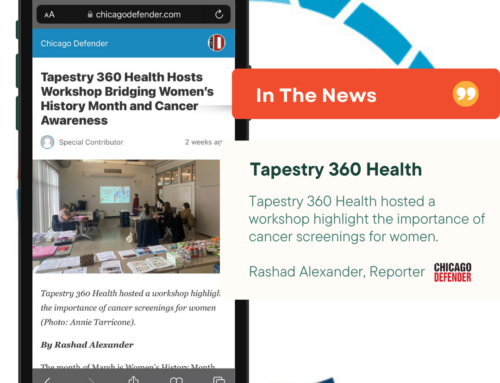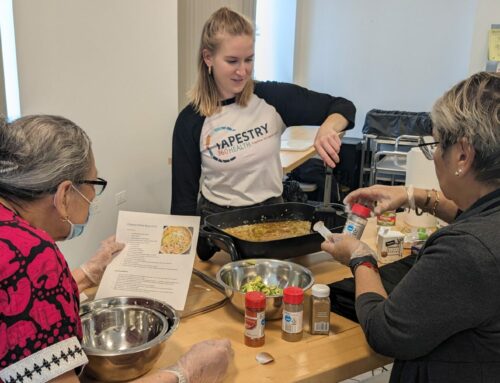News
Size-Inclusive Health Care

What is Size-Inclusive care?
Tapestry 360 Health is implementing a size-inclusive care program. Providers that practice within this program do not approach weight as something to be “fixed” and weight is not a focal point for medical treatment or intervention. Rather, their approach appreciates that bodies naturally come in all different shapes and sizes, and focuses on individualized, holistic care with the goal of increasing overall quality of life. Our size inclusive providers believe that everybody can achieve health and wellbeing in a way that matters to them, no matter one’s weight, and understand that health is multidimensional and can be impacted by several factors, such as stress, sleep, rest, joy, purpose, safety, nutrition, etc. Together, patient and provider can explore these areas and find solutions that center joy and individualized needs.
Tapestry 360 Health acknowledges the role that weight stigma can play in health outcomes and medical experiences and are committed to creating more affirming health care experiences for patients in all bodies.
What is weight stigma?
Weight-stigma is the negative attitudes, assumptions, and/or actions about a person’s weight, shape, or size.
Experiencing weight stigma can impact one’s mental, emotional, social, and physical health. Weight-stigma is also a public health issue that causes inequities in health outcomes, healthcare access, education, housing, employment, and many other areas.
Some examples include:
- Being given unsolicited weight loss advice
- Receiving negative comments about your size or shape
- Not being able to find clothes in your size
- Being denied a medical procedure because of your weight
Who can access Size-Inclusive Care?
Any adult, non-pregnant Tapestry 360 Patient can access size-inclusive care.
You might be a good fit for Size-inclusive care if you are:
– interested in learning more about this type of care
– feel depressed or anxious about your body size, shape, or weight
– worry about your eating habits, or feel a loss of control around foods.
– frequently dieting
– have experienced bullying or weight shaming
Please note, pregnant patients are an exception and weight may be captured. If you are not a Tapestry 360 Health patient, you can become established with a primary care provider to access size-inclusive care.
To schedule a visit or learn more, call 773-751-7800.
Size-Inclusive Care: Your Rights
- You have the right to decline to have your weight taken at a provider visit. Tapestry 360 Health recently launched a new guideline for practice where every adult patient will be given the option to choose if they would like to be weighed or not be weighed at their visit.
- You have the right to ask questions to a provider, medical assistant, or front desk staff member if something does not feel right to you.
Size-Inclusive Care Providers
Schedule with Anuj K. Shah, MD, MPH.

Schedule with Sreela Namboodiri, MD

Schedule with Talia Eisenstein, MD
Training Opportunities
Dr. Sreela Namboodiri and Dietitian Amanda Montgomery are available to facilitate trainings or provide consultation at your organization to help build a size-inclusive care environment or practice. Our dedicated size-inclusive care team practice from a Health At Every Size (HAES) framework. Learn more about the HAES framework.
Sample trainings include:
- Weight and Health in Medicine and FQHC settings
- Addressing weight and health for youth
- Understanding weight stigma
Contact Amanda Montgomery, RD, LDN, MPH for more information at [email protected]
Resources:
Visit this resource list for a detailed list!
Podcasts
- Ten Percent Happier (Dan Harris) – Anti Diet with Evelyn Tribole
- Food Psych – Christy Harrison and Dr. Jennifer Gaudiani
- Nutrition Lifestyles with Kim and Johane feat. Mikey Mercedes (focused on BIPOC Fat liberation)
- Dr. Jennifer Gaudiani- all podcasts
- Rebel Eaters Club (Virgie Tovar)
- Maintenance Phase
- The Other Human in the Room
Websites:
Books:
- “The Body is Not an Apology” by Sonya Renee Taylor
- “Hunger” by Roxane Gay
- “Intuitive Eating” Evelyn Tribole and Elyse Resch
- “Intuitive Eating Workbook” Evelyn Tribole and Elyse Resch
Sample scripts and Presentations:
- Weight and Health Session 1: https://youtu.be/gyKOYbT41RY
Research articles
- Aphramor, L. Validity of claims made in weight management research: a narrative review of dietetic articles. Nutr J 9, 30 (2010). https://doi.org/10.1186/1475-2891-9-30
- Bacon, L. & Aphramor, L. (2011). Weight science: evaluating the evidence for a paradigm shift. Nutrition journal, 10(1), 9.
- Hunger, J.M., et al. (2020). An evidence-based rationale for adopting weight-inclusive health policy. Social Issues and Policy Review, 14(1), 73-107.
- Meadows, A., Sigrún Daníelsdóttir, S., Goldberg, D., & Mercedes, M. (2020) Fighting for a (wide enough) seat at the table: weight stigma in law and policy. Fat Studies. DOI: 10.1080/21604851.2020.1835295
- Tylka, T. L., Annunziato, R. A., Burgard, D., Daníelsdóttir, S., Shuman, E., Davis, C., & Calogero, R. M. (2014). The weight-inclusive versus weight-normative approach to health: evaluating the evidence for prioritizing well-being over weight loss. Journal of obesity, 2014, 983495. https://doi.org/10.1155/2014/983495
What is Size-Inclusive care?
Tapestry 360 Health is implementing a size-inclusive care program. Providers that practice within this program do not approach weight as something to be “fixed” and weight is not a focal point for medical treatment or intervention. Rather, their approach appreciates that bodies naturally come in all different shapes and sizes, and focuses on individualized, holistic care with the goal of increasing overall quality of life. Our size inclusive providers believe that everybody can achieve health and wellbeing in a way that matters to them, no matter one’s weight, and understand that health is multidimensional and can be impacted by several factors, such as stress, sleep, rest, joy, purpose, safety, nutrition, etc. Together, patient and provider can explore these areas and find solutions that center joy and individualized needs.
Tapestry 360 Health acknowledges the role that weight stigma can play in health outcomes and medical experiences and are committed to creating more affirming health care experiences for patients in all bodies.
What is weight stigma?
Weight-stigma is the negative attitudes, assumptions, and/or actions about a person’s weight, shape, or size.
Experiencing weight stigma can impact one’s mental, emotional, social, and physical health. Weight-stigma is also a public health issue that causes inequities in health outcomes, healthcare access, education, housing, employment, and many other areas.
Some examples include:
- Being given unsolicited weight loss advice
- Receiving negative comments about your size or shape
- Not being able to find clothes in your size
- Being denied a medical procedure because of your weight
Who can access Size-Inclusive Care?
Any adult, non-pregnant Tapestry 360 Patient can access size-inclusive care.
You might be a good fit for Size-inclusive care if you are:
– interested in learning more about this type of care
– feel depressed or anxious about your body size, shape, or weight
– worry about your eating habits, or feel a loss of control around foods.
– frequently dieting
– have experienced bullying or weight shaming
Please note, pregnant patients are an exception and weight may be captured. If you are not a Tapestry 360 Health patient, you can become established with a primary care provider to access size-inclusive care.
To schedule a visit or learn more, call 773-751-7800.
Size-Inclusive Care: Your Rights
- You have the right to decline to have your weight taken at a provider visit. Tapestry 360 Health recently launched a new guideline for practice where every adult patient will be given the option to choose if they would like to be weighed or not be weighed at their visit.
- You have the right to ask questions to a provider, medical assistant, or front desk staff member if something does not feel right to you.
Size-Inclusive Care Providers
Schedule with Anuj K. Shah, MD, MPH.

Schedule with Sreela Namboodiri, MD

Schedule with Talia Eisenstein, MD
Training Opportunities
Dr. Sreela Namboodiri and Dietitian Amanda Montgomery are available to facilitate trainings or provide consultation at your organization to help build a size-inclusive care environment or practice. Our dedicated size-inclusive care team practice from a Health At Every Size (HAES) framework. Learn more about the HAES framework.
Sample trainings include:
- Weight and Health in Medicine and FQHC settings
- Addressing weight and health for youth
- Understanding weight stigma
Contact Amanda Montgomery, RD, LDN, MPH for more information at [email protected]
Resources:
Visit this resource list for a detailed list!
Podcasts
- Ten Percent Happier (Dan Harris) – Anti Diet with Evelyn Tribole
- Food Psych – Christy Harrison and Dr. Jennifer Gaudiani
- Nutrition Lifestyles with Kim and Johane feat. Mikey Mercedes (focused on BIPOC Fat liberation)
- Dr. Jennifer Gaudiani- all podcasts
- Rebel Eaters Club (Virgie Tovar)
- Maintenance Phase
- The Other Human in the Room
Websites:
Books:
- “The Body is Not an Apology” by Sonya Renee Taylor
- “Hunger” by Roxane Gay
- “Intuitive Eating” Evelyn Tribole and Elyse Resch
- “Intuitive Eating Workbook” Evelyn Tribole and Elyse Resch
Sample scripts and Presentations:
- Weight and Health Session 1: https://youtu.be/gyKOYbT41RY
Research articles
- Aphramor, L. Validity of claims made in weight management research: a narrative review of dietetic articles. Nutr J 9, 30 (2010). https://doi.org/10.1186/1475-2891-9-30
- Bacon, L. & Aphramor, L. (2011). Weight science: evaluating the evidence for a paradigm shift. Nutrition journal, 10(1), 9.
- Hunger, J.M., et al. (2020). An evidence-based rationale for adopting weight-inclusive health policy. Social Issues and Policy Review, 14(1), 73-107.
- Meadows, A., Sigrún Daníelsdóttir, S., Goldberg, D., & Mercedes, M. (2020) Fighting for a (wide enough) seat at the table: weight stigma in law and policy. Fat Studies. DOI: 10.1080/21604851.2020.1835295
- Tylka, T. L., Annunziato, R. A., Burgard, D., Daníelsdóttir, S., Shuman, E., Davis, C., & Calogero, R. M. (2014). The weight-inclusive versus weight-normative approach to health: evaluating the evidence for prioritizing well-being over weight loss. Journal of obesity, 2014, 983495. https://doi.org/10.1155/2014/983495


















